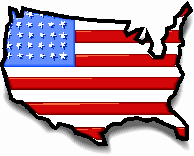|
|
| |
|
|
| |
|
Home -
Study
English in America |
|
|
|
| |
 Study
English in America Study
English in America
America is the most visited country in the world and American
English is the English most international students choose to learn.
Learning American English is useful not only for academic study and
your career, but knowing how to read, write, speak, and listen to
American English makes it easier for you to enjoy your favorite
American movies, TV stations, radio programs, novels, or travel
throughout the 50 United States.
The following information will make
it easier for you to apply for, and adjust to, study in the United
States of America. |
|
 Living
in the United States Living
in the United States
You certainly have heard stories, good or bad, about American
people. You also probably have preconceived ideas from having met
Americans before or from films and television programs that color
your impression of what Americans are and what they do.
This section will at least give you some idea of what to expect in America
and from
Americans. |
-
Society and Culture in the U.S.
-
Americans
- You certainly have heard stories, good or bad, about
American people.
-
Eating
- Restaurants in the United States range from
inexpensive "fast-food" to very expensive restaurants.
-
Shopping - Shopping is one of America's favorite
pastimes.
-
Social Customs - Some students might find it
initially difficult to understand the way Americans
behave.
-
Sports, Recreation, and Entertainment - The United
States offers limitless opportunities for sports,
recreation, and entertainment.
-
Religion and Religious Freedom - America is one of,
if not the, most religiously diverse country in the
world.
-
Adjusting to a
New Environment
-
Jet Lag - One of the first adjustments you will have
to face after your arrival in the United States is "jet
lag."
-
Language Problems - Some language problems you may
encounter while in the United States.
-
Culture Shock - Culture shock is the process of
adjusting to a new country and a new culture.
-
Getting Involved in the Community - There are many
community organizations.
-
If an Emergency Occurs at Home - it is possible that
while you are in the United States, a problem could
arise at home.
-
Practical
Information for Everyday Living
-
Health and
Wellness - When traveling abroad, you always have to
be ready for extreme or unfamiliar conditions.
-
Personal
Safety - Unfortunately, as everywhere else in the
world, there is crime in the United States.
-
Transportation
- Upon arriving in the United States you will soon need
to make a decision about transportation.
-
Money Matters - America is no longer a cash society.
-
Telecommunications
- A telephone is definitely a necessity in the United
States.
-
Using the U.S.
Postal Service - The U.S. Postal Service offers a
wide variety of services.
-
Clubs and
Sports - Joining any of the vast number of clubs and
sports groups is the best way to make new friends.
-
Arrangements for
Dependents - If your family will accompany you to
the United States, there are other things to consider.
-
Beginning
Your U.S. Education
-
First
Days at the University - The first few days at your
U.S. college or university can be a truly exciting time.
-
Campus and
Department Orientation - Orientation programs for
new students are offered at virtually every college and
university.
-
The
Academic Advisor - When you enter a university or
college, you will usually be assigned an academic
adviser.
-
The
Academic Year - For most colleges and universities,
the academic year begins in late August or early
September.
-
The
Academic Program - Undergraduate programs are
designed to give students a fairly broad educational
background.
-
Course
Registration - Registration procedures are different
at each educational institution.
-
Professors
- The social code of behavior between students and
professors is not as precisely defined in the United
States.
-
The
Honor Code - Most colleges and universities in the
United States have established honor codes or statements
of rules.
-
Study
Skills - It is common for students to think that
they already know how to be a successful student.
|
|
 Pre-departure
Information Pre-departure
Information
This section lists the important documents you should bring with you
to the United States. It also discusses health insurance and other
matters that you must investigate and organize prior to leaving your
home country. The section also addresses financial issues and
academic preparations you might need to make. |
|
|
 Short-Term
Study Short-Term
Study
The United States offers a wide range of short-term study programs
lasting 12 months or less, including high school exchange programs,
work and professional exchange programs, vocational and technical
programs, short-term university study, and professional study.
Testing requirements for short-term study vary greatly between
programs, so interested applicants should contact the programs in
which they are interested. |
|
|
|
 Undergraduate
Study Undergraduate
Study
The undergraduate education system explained: information on types
of institutions, degrees, liberal arts, schedules, and grading.
Choosing among the numerous institutions of higher education is
difficult, and the admissions process is complicated. Here's a road
map. In order to study in the United States, students take
standardized tests such as the TOEFL, SAT I, SAT II Subject Tests,
ACT, GRE, GMAT, and others. |
|
|
 Graduate Study Graduate Study
The graduate education system explained: masters degrees, doctoral
degrees and why a degree from the United States matters. Choosing
among the numerous institutions of higher education is difficult,
and the admissions process is complicated. Here's a road map. In
order to study in the United States, students take standardized
tests such as the TOEFL, SAT I, SAT II Subject Tests, ACT, GRE,
GMAT, and others. |
|
|
|
|
|
|
|
|
|
|
|
|
|
|
|
|
|
|
Search Fun Easy English |
|
|
|
|
|
|
|
|
|
|
|
|
|
|
|
About
Contact
Copyright
Resources
Site Map |